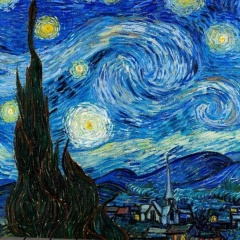Если просят - значит - это кому-нибудь нужно.
Про "Сто лет одиночества".
Эта книга, ровно как и писатель, была для меня загадкой. Ещё несколько недель назад я не знал, что Габриэль Гарсиа Маркес колумбиец, что он был в Советском Союзе, и далеко не раз. Ему даже принадлежит цитата: "Я всегда говорил и никогда не откажусь от своих слов, что самые интересные люди живут в России".
И вот, полный неведения, я решил приоткрыть завесу тайны и попробовать на вкус творчество колумбийца. "Сто лет одиночества" сразу начинается с хронологическим нарушением, что всегда немного запутывает, но интригует. Поначалу думаешь, что полковник Аурелиано Буэндиа является главным героем повествования. Потом понимаешь, что это не так, когда продолжаешь читать дальше историю этой странной семьи, живущей в не менее странном поселении Макондо. А когда переваливаешь через экватор, ещё раз переворачиваешь своё мнение относительно вопроса о главных персонажах. Точнее, понимаешь, что уже мало что понимаешь. В хронологии дерева семьи начинаешь путаться буквально сразу, но это совершенно не мешает чтению. Совсем неважно, кто именно испытывает на себе превратности жизни, какой из потомков сменяет собой предка и запускает колесо судьбы по новому кругу. Ты как будто читаешь собирательный образ. Шаг влево, шаг вправо, а каждый из многочисленных персонажей несёт одно бремя. Бремя одиночества. Тема эта мало того что вынесена в заголовок, так ею пропитана буквально каждая из страниц книги. И затмевает эта тема собой многое. Ведь скрывается же за ней ещё что-то, верно?..
Честно говоря, я так и не понял. Магический реализм вообще не в разряде моих любимых жанров. Патока первых страниц начинает быстро приедаться. Есть, правда, несколько очень удачных метафор, до того точно отражающих поведение в современном обществе, что хочется попросту снять шляпу перед автором. Но бывают и сцены, где задумываешься: "Ну зачем это нужно?" Но здесь, скорее, я понимаю, что всё же нужно. Только, боюсь, не понимаю, зачем.
Что ж, на то оно и знакомство - осторожное, с поспешными выводами, с лёгким намёком на второе свидание. Но будет ли оно?..
Про "Сто лет одиночества".
Эта книга, ровно как и писатель, была для меня загадкой. Ещё несколько недель назад я не знал, что Габриэль Гарсиа Маркес колумбиец, что он был в Советском Союзе, и далеко не раз. Ему даже принадлежит цитата: "Я всегда говорил и никогда не откажусь от своих слов, что самые интересные люди живут в России".
И вот, полный неведения, я решил приоткрыть завесу тайны и попробовать на вкус творчество колумбийца. "Сто лет одиночества" сразу начинается с хронологическим нарушением, что всегда немного запутывает, но интригует. Поначалу думаешь, что полковник Аурелиано Буэндиа является главным героем повествования. Потом понимаешь, что это не так, когда продолжаешь читать дальше историю этой странной семьи, живущей в не менее странном поселении Макондо. А когда переваливаешь через экватор, ещё раз переворачиваешь своё мнение относительно вопроса о главных персонажах. Точнее, понимаешь, что уже мало что понимаешь. В хронологии дерева семьи начинаешь путаться буквально сразу, но это совершенно не мешает чтению. Совсем неважно, кто именно испытывает на себе превратности жизни, какой из потомков сменяет собой предка и запускает колесо судьбы по новому кругу. Ты как будто читаешь собирательный образ. Шаг влево, шаг вправо, а каждый из многочисленных персонажей несёт одно бремя. Бремя одиночества. Тема эта мало того что вынесена в заголовок, так ею пропитана буквально каждая из страниц книги. И затмевает эта тема собой многое. Ведь скрывается же за ней ещё что-то, верно?..
Честно говоря, я так и не понял. Магический реализм вообще не в разряде моих любимых жанров. Патока первых страниц начинает быстро приедаться. Есть, правда, несколько очень удачных метафор, до того точно отражающих поведение в современном обществе, что хочется попросту снять шляпу перед автором. Но бывают и сцены, где задумываешься: "Ну зачем это нужно?" Но здесь, скорее, я понимаю, что всё же нужно. Только, боюсь, не понимаю, зачем.
Что ж, на то оно и знакомство - осторожное, с поспешными выводами, с лёгким намёком на второе свидание. Но будет ли оно?..
If they ask, it means that someone needs it.
About One Hundred Years of Solitude.
This book, just like the writer, was a mystery to me. A few weeks ago, I did not know that Gabriel García Márquez was a Colombian, that he was in the Soviet Union, and more than once. He even owns a quote: "I have always said and will never give up my words that the most interesting people live in Russia."
And so, full of ignorance, I decided to open the veil of secrecy and taste the work of the Colombian. "One Hundred Years of Solitude" immediately begins with a chronological breakdown, which is always a little confusing but intriguing. At first, you think that Colonel Aureliano Buendía is the main character of the story. Then you realize that this is not so when you continue to read the story of this strange family living in the equally strange settlement of Macondo. And when you cross the equator, you once again turn over your opinion on the question of the main characters. More precisely, you understand that you already understand very little. In the chronology of the family tree, you start to get confused literally right away, but this does not interfere with reading at all. It does not matter at all who exactly experiences the vicissitudes of life, which of the descendants replaces the ancestor and starts the wheel of fate in a new circle. You seem to be reading a collective image. Step left, step right, and each of the many characters bears the same burden. The burden of loneliness. This topic is not only included in the title, but literally every page of the book is saturated with it. And this topic overshadows a lot. After all, there is something else behind her, right? ..
To be honest, I never got it. Magic realism is not my favorite genre at all. The molasses on the first pages starts to wear out quickly. There are, however, several very successful metaphors that reflect the behavior in modern society so accurately that one just wants to take off his hat to the author. But there are also scenes where you think: "Well, why is this necessary?" But here, rather, I understand what is still needed. Only, I'm afraid I don't understand why.
Well, that's what it is and acquaintance - cautious, with hasty conclusions, with a slight hint of a second date. But will it be? ..
About One Hundred Years of Solitude.
This book, just like the writer, was a mystery to me. A few weeks ago, I did not know that Gabriel García Márquez was a Colombian, that he was in the Soviet Union, and more than once. He even owns a quote: "I have always said and will never give up my words that the most interesting people live in Russia."
And so, full of ignorance, I decided to open the veil of secrecy and taste the work of the Colombian. "One Hundred Years of Solitude" immediately begins with a chronological breakdown, which is always a little confusing but intriguing. At first, you think that Colonel Aureliano Buendía is the main character of the story. Then you realize that this is not so when you continue to read the story of this strange family living in the equally strange settlement of Macondo. And when you cross the equator, you once again turn over your opinion on the question of the main characters. More precisely, you understand that you already understand very little. In the chronology of the family tree, you start to get confused literally right away, but this does not interfere with reading at all. It does not matter at all who exactly experiences the vicissitudes of life, which of the descendants replaces the ancestor and starts the wheel of fate in a new circle. You seem to be reading a collective image. Step left, step right, and each of the many characters bears the same burden. The burden of loneliness. This topic is not only included in the title, but literally every page of the book is saturated with it. And this topic overshadows a lot. After all, there is something else behind her, right? ..
To be honest, I never got it. Magic realism is not my favorite genre at all. The molasses on the first pages starts to wear out quickly. There are, however, several very successful metaphors that reflect the behavior in modern society so accurately that one just wants to take off his hat to the author. But there are also scenes where you think: "Well, why is this necessary?" But here, rather, I understand what is still needed. Only, I'm afraid I don't understand why.
Well, that's what it is and acquaintance - cautious, with hasty conclusions, with a slight hint of a second date. But will it be? ..
У записи 1 лайков,
0 репостов.
0 репостов.
Эту запись оставил(а) на своей стене Юра Доленко





















